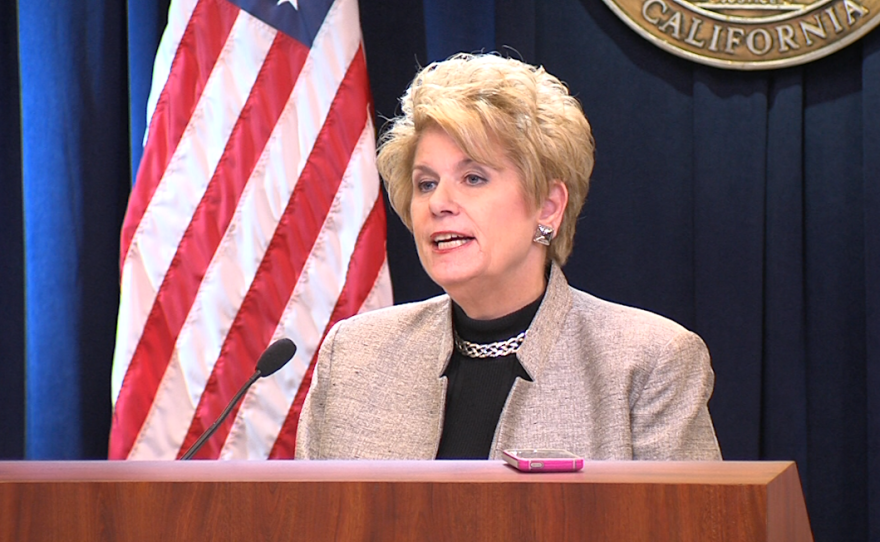Former U.S. Attorney Laura Duffy and District Attorney Bonnie Dumanis exchanged texts and a phone call that referenced the trial of a Mexican billionaire even though Duffy was recused from the case and Dumanis was a witness in the trial.
Defense lawyers are now using the communications to renew their request for information on why Duffy was recused in last year’s campaign corruption case against Jose Susumo Azano Matsura. He was convicted in September on dozens counts including conspiracy to contribute illegally to U.S. elections as a foreign national.
“Ms. Dumanis is described as a 'subject' of the investigation in the case in a FBI 302 report,” wrote Azano’s defense lawyer Knut Johnson. “Based on that continued communication about this case between the recused U.S. Attorney and a subject of the investigation during the trial, Mr. Azano again asks this court to order the production of Duffy’s 'written memorandum'; the reason for the recusal and emails, documents, letters or any other evidence...of any conflict.”
Johnson included the communications in a public filing Tuesday. The transcription of the text messages appear in an August email from San Diego Assistant U.S. Attorney Phil Halpern to Azano’s former defense lawyer Michael Wynne.
“It came to my attention that over the last several months there have been a few communications that ‘touched’ on the Azano case,” Halpern wrote. “I don’t believe that any of these communications constitute discovery falling within Brady, Giglio, Jencks, or Rule 16. Nevertheless, we are identifying them out of an abundance of caution.”
Halpern wrote that last June, District Attorney Dumanis texted U.S. Attorney Duffy about the selection of one of the prosecutors in the case against Azano to fill an open magistrate judge position.
Dumanis: "Was magistrate position yours?”
Duffy: "Yep. Ugh."
Dumanis: "On the big case? Will he finish?"
Duffy: "Call me Right quick -- can you?"
According to Halpern’s email, in the subsequent phone conversation Duffy said she understood that the prosecutor was going to ask for permission to take the bench after the Azano trial was concluded.
Halpern declined to comment as did the U.S. attorney’s office.

Dumanis spokesman Tanya Sierra said, ““There was nothing inappropriate, improper or unethical about the communication between the District Attorney and then-U.S. Attorney.”
Los Angeles ethics lawyer Arthur Margolis called the texts and phone call between the two prosecutors inappropriate.
“The recused attorney disclosed to Dumanis, who was a defense witness, information about the prosecutor’s office’s intentions in terms of whether a certain prosecutor would remain on the case and whether there would be a possible delay in the trial,” Margolis said. "That was information relevant to the case and should not have been disclosed. It also raises the questions of why did Duffy have that information. Being recused, she should have never had the information."
Margolis also questioned why the conversation between Duffy and Dumanis was moved to the phone.
“It appears what they’re attempting to do is to communicate in a way that there would be no record of it,” Margolis said. “It seems to indicate some kind of a guilty state of mind, or, being very careful about what might be said or thought about their communication. It’s very suspicious.”
But former San Diego U.S. Attorney Peter Nunez believes the exchanges are not “that big of a deal” because even though the prosecution turned them over, the defense never used the information at trial.
“Apparently, it had no effect on the prosecution or the defense of the case,” Nunez said.
During the June conversation, according to Halpern, Duffy also said she did not know what was going on in the case because she was recused. Dumanis said she understood the recusal and would not ask any more questions about the substance of the case.
She said in her earlier text messages she only wanted to learn if the trial would be continued because she was hoping that wouldn't happen.
And in that phone chat, Duffy also relayed she had learned that a local reporter had inquired whether Dumanis had been tipped off about search warrants in the Azano case and called the FBI and told them she would comply with any records request.
In early August, there was another text exchange between Duffy and Dumanis. Duffy asked how Dumanis was “holding up through the Azano press coverage.” The following day, Dumanis responded with, “I think it best not to communicate right now. But thanks for checking in.”
Duffy, who is now a San Diego Superior Court judge, did not respond to a request for comment.






